


Top 10 Best Influencer Analytics Tools
Influencer analytics tools have become essential for brands looking to measure the real impact of their influencer campaigns. From tracking engagement rates to uncovering audience authenticity and ROI, these platforms help marketers make data-driven decisions. With so many options available, finding the right tool can make all the difference in scaling influencer strategies effectively.
In this article, we’ve rounded up the best influencer analytics tools that empower brands, agencies, and eCommerce businesses to optimize performance and maximize campaign success. Let’s dive into the top influencer analytics platforms helping brands turn metrics into measurable growth.
Why Are Influencer Analytics Important
Influencer analytics provide the foundation for understanding what works, and what doesn’t, in your campaigns.
By tracking key performance metrics, brands can evaluate which creators genuinely drive engagement, conversions, and brand awareness. This data-driven approach eliminates guesswork and helps allocate budgets more efficiently.
Beyond performance measurement, analytics also reveal audience authenticity and content resonance, ensuring collaborations align with your brand’s target market. They enable marketers to identify top-performing influencers, refine messaging, and build stronger, long-term partnerships. In short, influencer analytics turn insights into strategy, helping brands scale campaigns with confidence and measurable impact.
What to Look for in Top Influencer Analytics Tools
Choosing the right influencer analytics platform depends on your brand’s goals, budget, and campaign complexity. The best tools go beyond surface metrics to provide deep insights into performance, authenticity, and conversion impact.
Here are a few key features to consider:
- Comprehensive Analytics: Look for tools that measure engagement rates, impressions, reach, audience growth, and ROI across multiple social platforms.
- Audience Insights: The ability to analyze demographics, interests, and follower authenticity ensures you partner with the right creators.
- Campaign Tracking: Real-time dashboards and reporting help monitor performance and adjust strategies on the go.
- AI & Automation: Advanced platforms use AI to detect fake followers, predict performance, and automate data collection.
- Integrations: Seamless connections with eCommerce platforms, CRMs, and affiliate systems make workflows smoother.
- User-Friendly Interface: A clear and intuitive dashboard helps marketing teams visualize data without needing deep technical expertise.
By focusing on these features, you can identify a platform that not only tracks metrics but also helps refine your influencer marketing strategy for long-term success.
Top 10 Best Influencer Analytics Tools
1. HypeAuditor
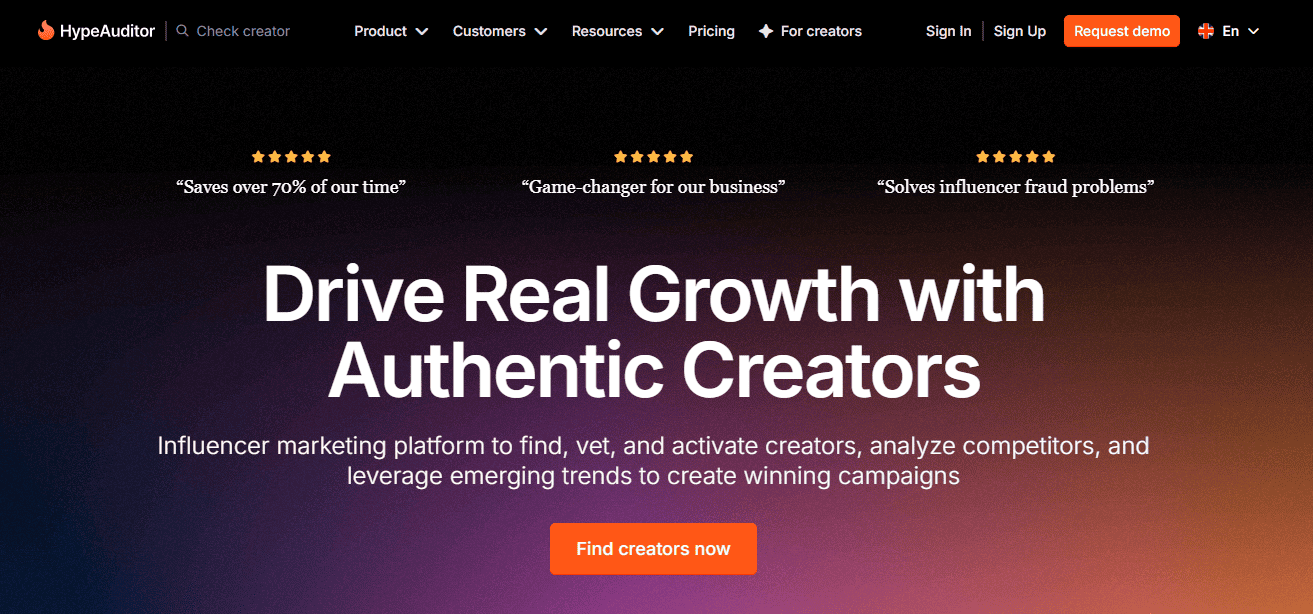
HypeAuditor is an influencer analytics and campaign management platform that helps brands identify authentic influencers, track performance, and manage collaborations. It’s designed for brands seeking reliable data, audience insights, and ROI tracking across social media.
Key Features
- eCommerce tracking via Shopify, Magento, and WooCommerce integrations
- Click and conversion tracking with UTM or JavaScript snippets
- Flexible influencer compensation (free product, flat fee, or commission)
- PayPal payouts for direct payments
- Automated performance analytics with engagement and revenue insights
- Editable campaign dashboards post-launch
Pricing
- HypeAuditor offers customizable pricing based on campaigns, reports and seats needed. A typical “Business” plan can start at $10.000/yearly, while its “Enterprise” option at $60.000/yearly.
Pros
- Strong eCommerce integration for end-to-end tracking
- Multiple payment models for flexible collaboration
- High customization for campaign tracking
- Simple campaign setup and editing
Cons
- No public pricing transparency
- Advanced analytics locked behind higher tiers
- Limited automation for influencer sourcing
- Best suited for mid-to-large brands
2. Influencer Hero
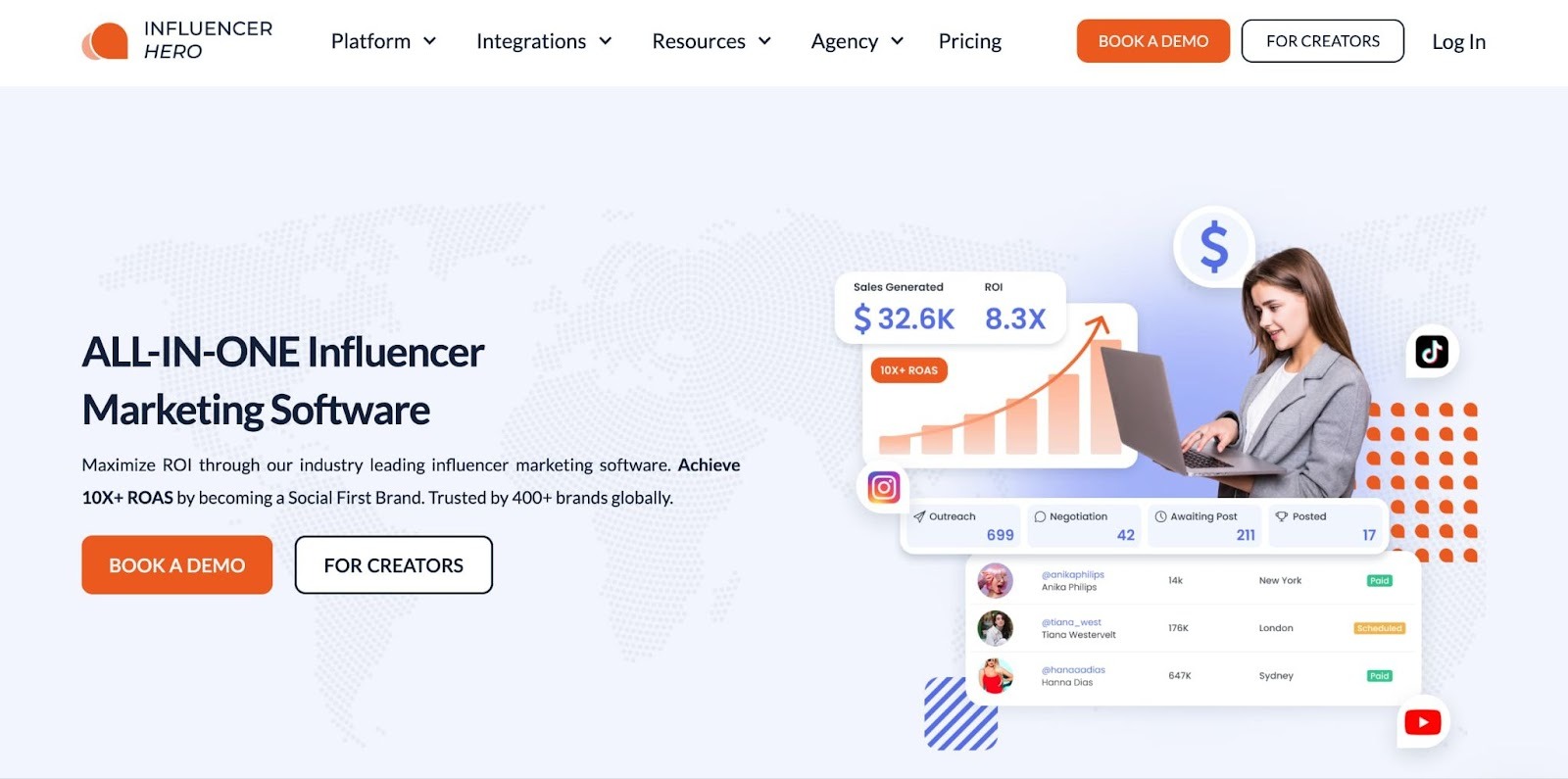
Influencer Hero is an all-in-one influencer marketing solution that combines search, outreach, tracking, and payments into one system. It’s known for its accessibility and straightforward design.
Key Features
- Cross-platform coverage (Instagram, TikTok, YouTube)
- Automated outreach and follow-ups
- Integrated campaign tracking and reporting
- Affiliate and discount code management
- Influencer gifting workflows
- Team collaboration tools
Pricing
- Standard Plan: $649/month – up to 1,000 creators
- Pro Plan: $1,049/month – up to 5,000 creators
- Business Plan: $2,490/month – up to 10,000 creators
- Custom/Agency Plan: Tailored pricing for enterprise use
Pros
- Easy-to-use UI ideal for small teams
- Solid outreach automation
- Affordable compared to enterprise competitors
- Strong support and onboarding
Cons
- Fewer advanced analytics options
- Smaller influencer database
- No AI-powered search
- Limited marketplace visibility (smaller creator pool)
3. Shopify Collabs
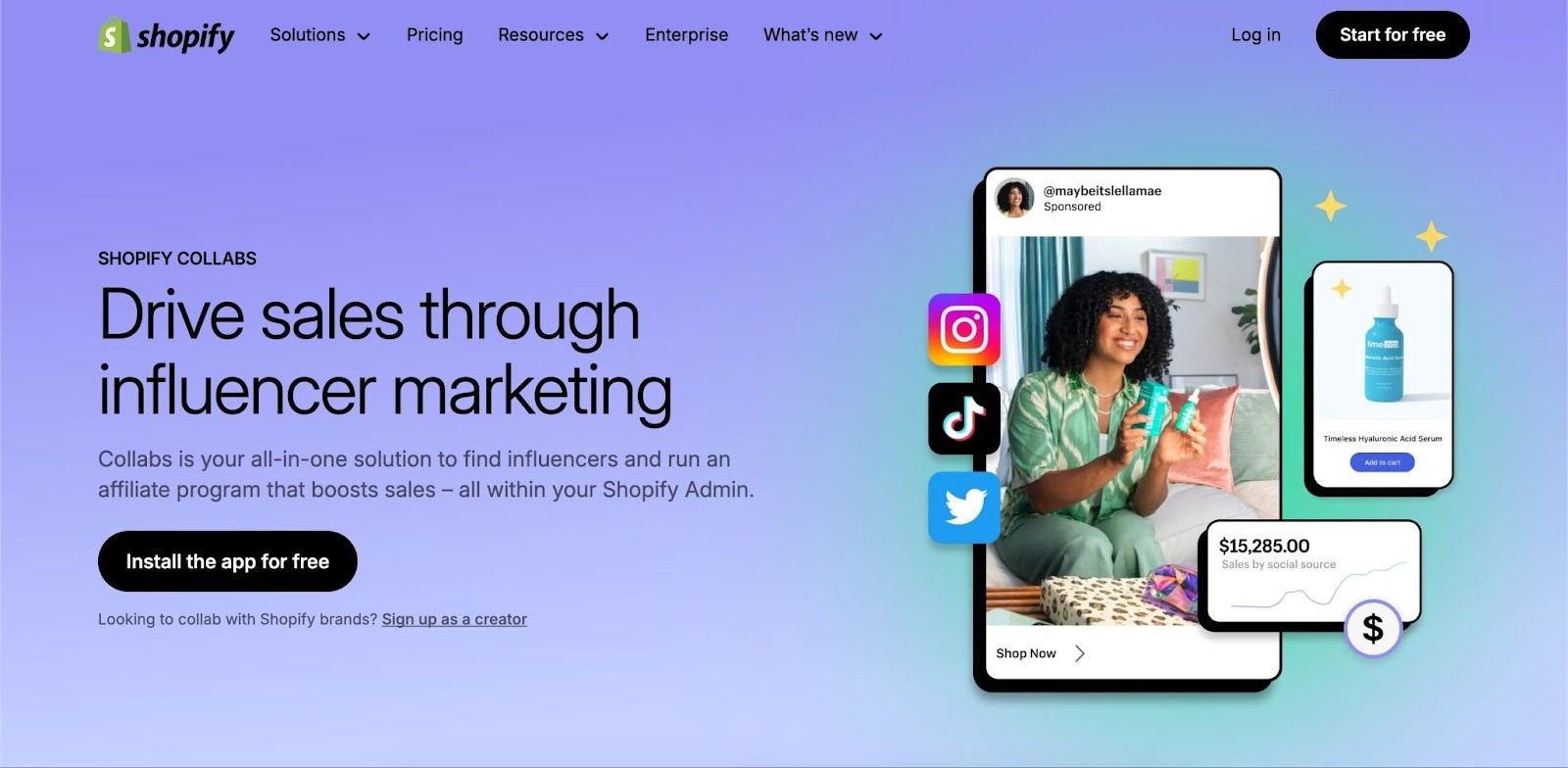
Shopify Collabs is Shopify’s native influencer collaboration tool built to connect merchants with creators for gifting and affiliate campaigns. It helps DTC brands recruit creators who align with their products.
Key Features
- Direct integration with Shopify stores
- Influencer application pages and product gifting
- Commission tracking through Shopify’s affiliate links
- Sales and performance reporting
- Automated product fulfillment and tracking
- Seamless management of creator relationships
Pricing
- Free for all Shopify merchants (fees may apply for affiliate payments).
Pros
- Completely integrated with Shopify ecosystem
- Simple setup and no additional subscription cost
- Great for small and mid-size DTC brands
- Streamlined gifting and affiliate workflows
Cons
- Limited creator discovery features
- No outreach automation tools
- Minimal customization for reporting
- Lacks CRM and campaign scalability found in dedicated platforms
4. Captiv8

Captiv8 is a data-driven influencer marketing platform focused on enterprise-scale brands. It provides deep campaign analytics, competitor insights, and full-funnel tracking.
Key Features
- Competitive intelligence (track competitor influencer activity)
- Deep performance analytics (ROAS, EMV, custom metrics)
- Team collaboration tools with comment and approval flows
- Filter locking for reusing search parameters
- Exportable reports for Google Analytics or Looker Studio
- Global creator database
Pricing
- $25,000/year minimum contract + onboarding fee ($3K), additional $20–30K/month for Storefronts and Affiliates.
Pros
- Enterprise-level analytics and campaign management
- Powerful competitor tracking
- Strong collaboration and workflow tools
- Scalable for global campaigns
Cons
- Very expensive with rigid annual-only contracts
- Customer service issues frequently reported
- Payment processing problems for both creators and brands
- Limited eCommerce integrations beyond Shopify and Refersion
5. Heepsy
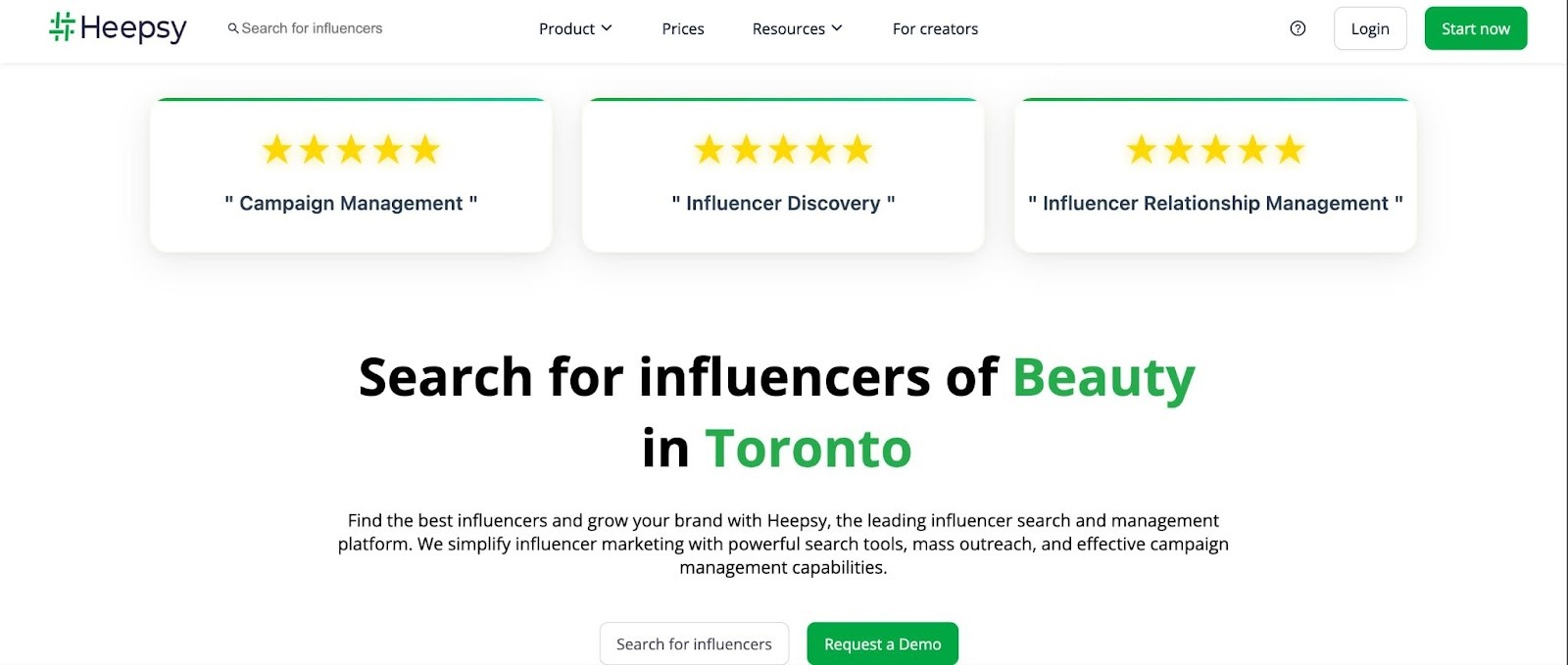
Heepsy is an influencer discovery and analytics platform best for small to medium-sized businesses. It focuses on helping brands find influencers through powerful filtering tools.
Key Features
- Database of 11M+ influencers
- Search by engagement rate, audience, location, and niche
- Influencer vetting (fake follower and audience credibility checks)
- Campaign lists and exportable reports
- Engagement and performance analytics
- Basic CRM features for campaign management
Pricing
- Free
- Starter: $89/month
- Plus: $249/month
- Advanced: $369/month
Pros
- Affordable entry-level pricing
- Easy-to-use interface
- Reliable influencer authenticity metrics
- Quick search and export capabilities
Cons
- Limited campaign management features
- No built-in communication or payment tools
- Lacks automation for outreach
6. Sprout Social
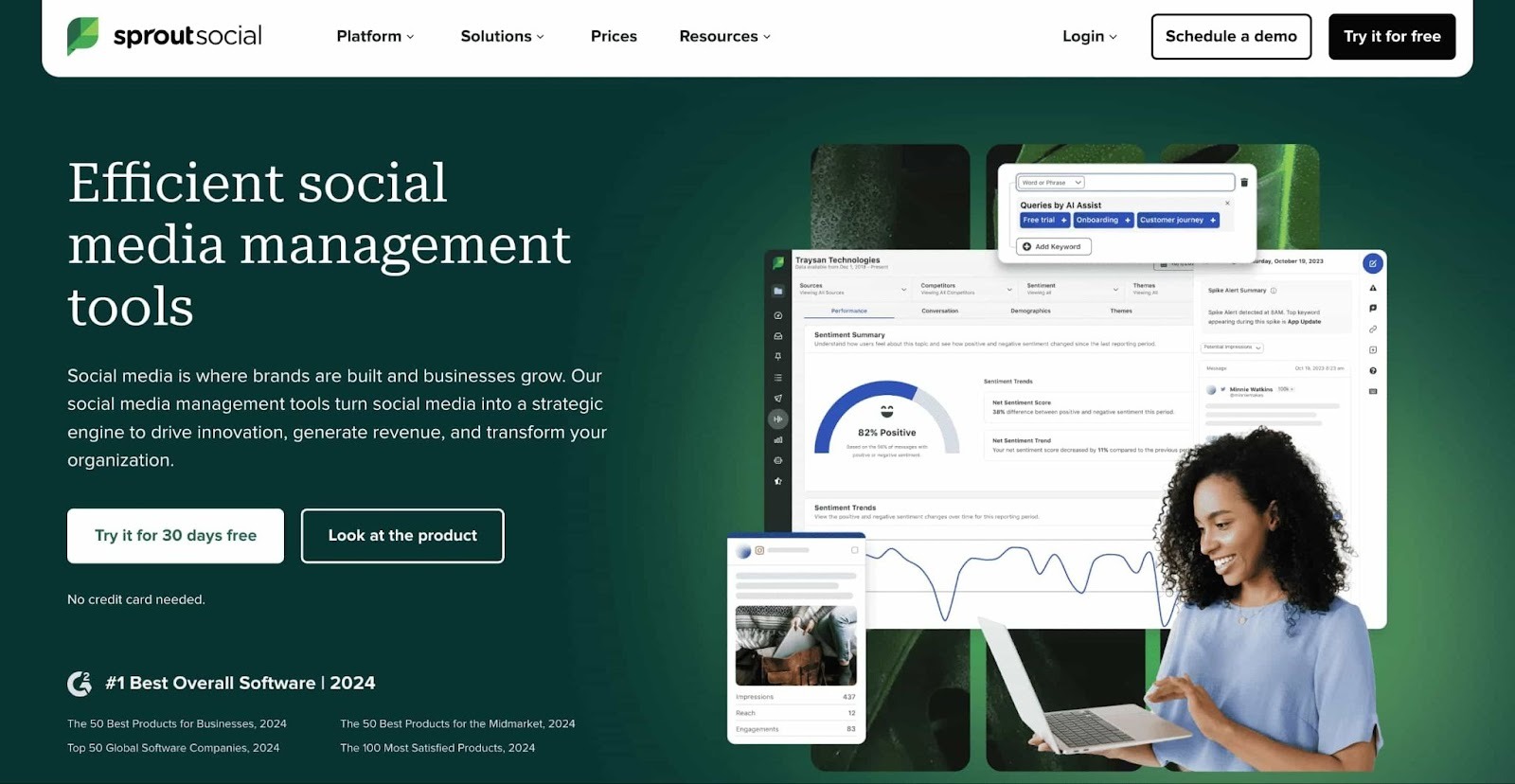
Sprout Social is an enterprise-level influencer and social media management platform that enables brands to discover creators, manage influencer relationships, and measure campaign ROI. It’s built for teams that want deep analytics and brand safety tools.
Key Features
- AI-Powered Brand Fit Score to match creators with brand values
- Brand Safety Filters that flag risky keywords or content
- Content Approval Workflows for draft post reviews before publishing
- Competitive Benchmarking Reports (compare competitors’ creator lists)
- Shopify & PayPal integrations for gifting and affiliate commission tracking
- Advanced analytics and EMV (Earned Media Value) reporting
Pricing
- Base Plan: Starts around $1,600/month per user plus $600 per extra user. You can pay monthly or annually, but a full-year commitment is mandatory. This translates into an annual investment of over $19,200 for one person or $25,200 for a team of two.
Pros
- AI-driven brand fit and safety scoring
- Deep analytics and competitive insights
- Streamlined content approval and collaboration
- Seamless Shopify gifting and tracking integration
Cons
- Very high entry price with no monthly plans
- No built-in UGC licensing or AI visual search
- Limited to major social platforms (IG, TikTok, YouTube)
- Bulk outreach capabilities unclear
7. CreatorIQ
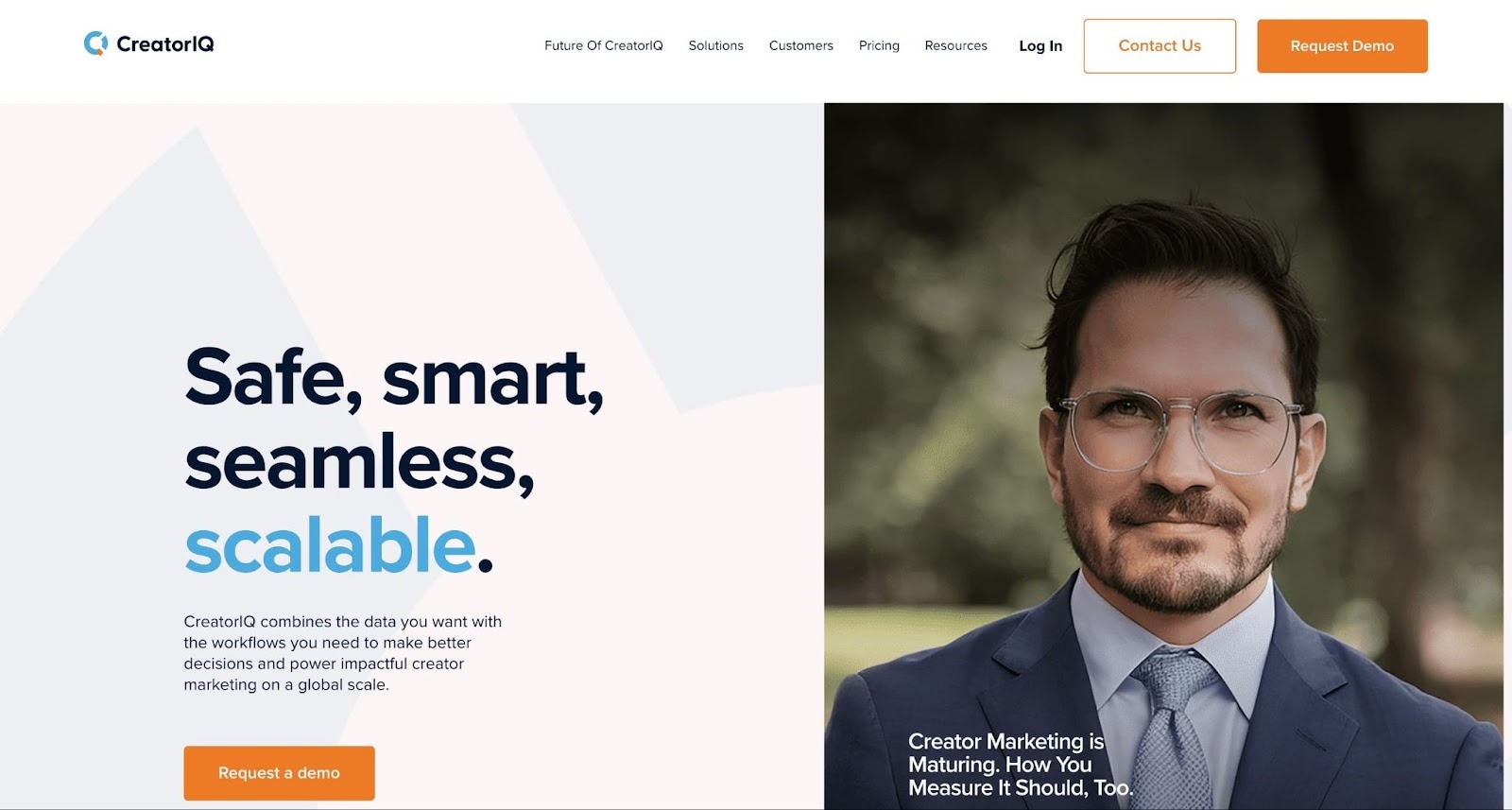
CreatorIQ is a top-tier influencer marketing platform used by global brands like Disney and Lululemon. It offers advanced discovery, CRM, and analytics tools designed for large-scale influencer programs.
Key Features
- Access to 30M+ creators with advanced AI & demographic filters
- Private CRM for managing creator relationships
- Shopify integration for gifting and affiliate tracking
- Custom dashboards and API-based reporting
- Integrated payment system with tax compliance and tracking
- Optional Creator Connect branded signup pages for recruitment
Pricing
- Starts at $35,000/year (Basic)
- Add-ons like Creator Connect +$15K/year.
Pros
- Extremely robust and scalable infrastructure
- AI-powered discovery and live analytics
- All-in-one reporting and content library
- Built-in payment processing and compliance tools
Cons
- High cost and annual commitment only
- Affiliate tracking is semi-manual (limited automation)
- Complex onboarding for small teams
- Some features (like Creator Connect) require extra fees
8. Aspire
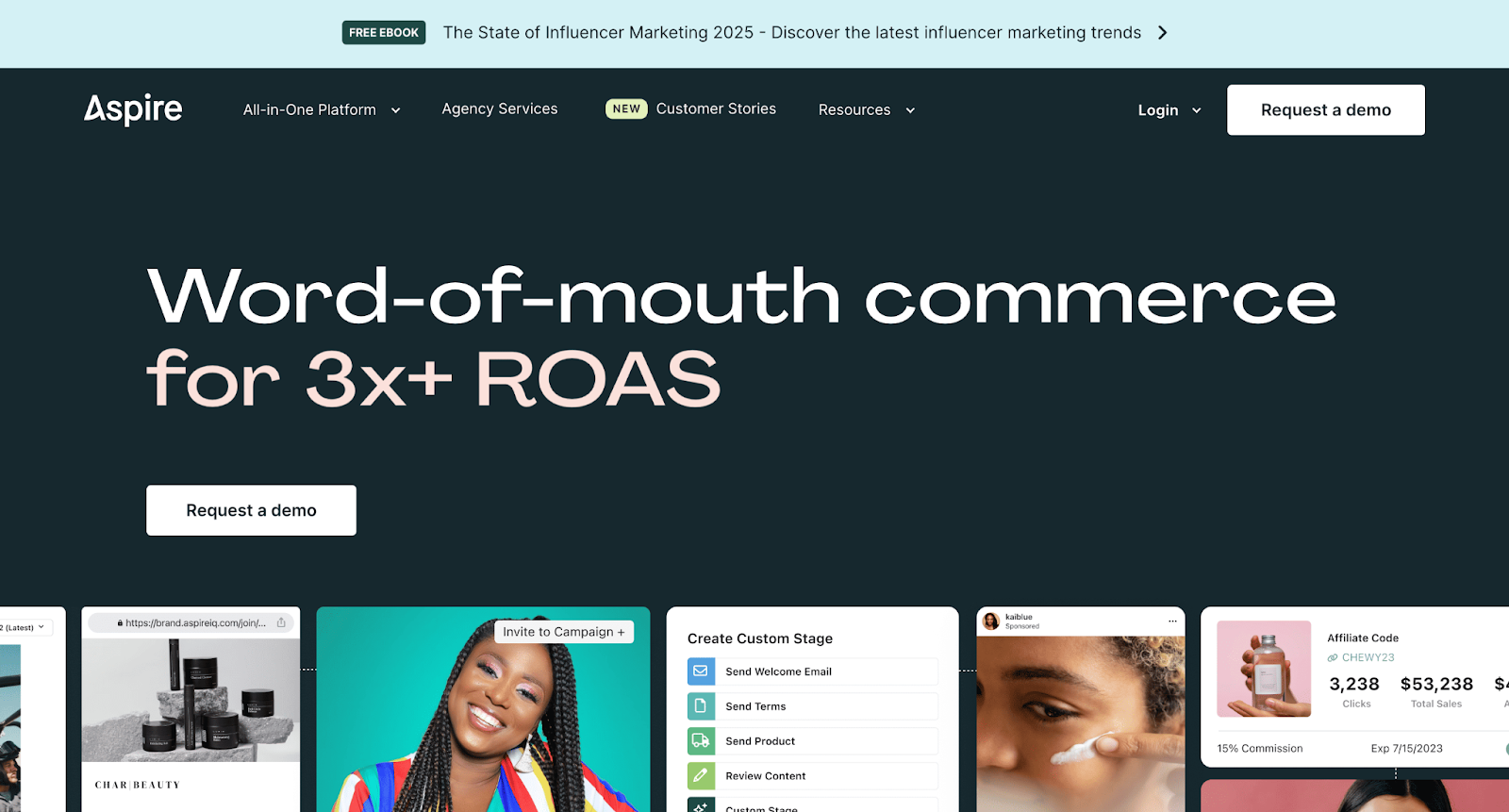
Aspire is an end-to-end influencer marketing platform built for eCommerce brands. It combines creator discovery, inbound applications, gifting, and sales tracking in one centralized dashboard.
Key Features
- First-party social data (Meta, TikTok, Pinterest) for accurate metrics
- Inbound marketplace with 1M+ creators applying to campaigns
- Custom landing pages for creator recruitment
- Automated follow-ups and contract workflows
- Shopify integration for product gifting and sales tracking
- Full campaign reporting (sales, clicks, conversions, ROI)
Pricing
- Mid-Tier Plan: Around $2,300/month, supporting 20–40 creators monthly, unlimited users, and up to 500 creators in CRM.
- Pricing typically ranges from $2,000–$5,000/month, depending on features and creator volume.
- Contracts are generally annual, though terms can be adjusted during onboarding.
Pros
- Access to a massive inbound creator network
- Full automation from contracts to fulfillment
- First-party data ensures higher accuracy
- Excellent customer support and onboarding
Cons
- High price for smaller brands
- No in-app payment processing
- Limited platform coverage beyond Instagram, TikTok, YouTube
- Overkill for small influencer programs
9. Upfluence
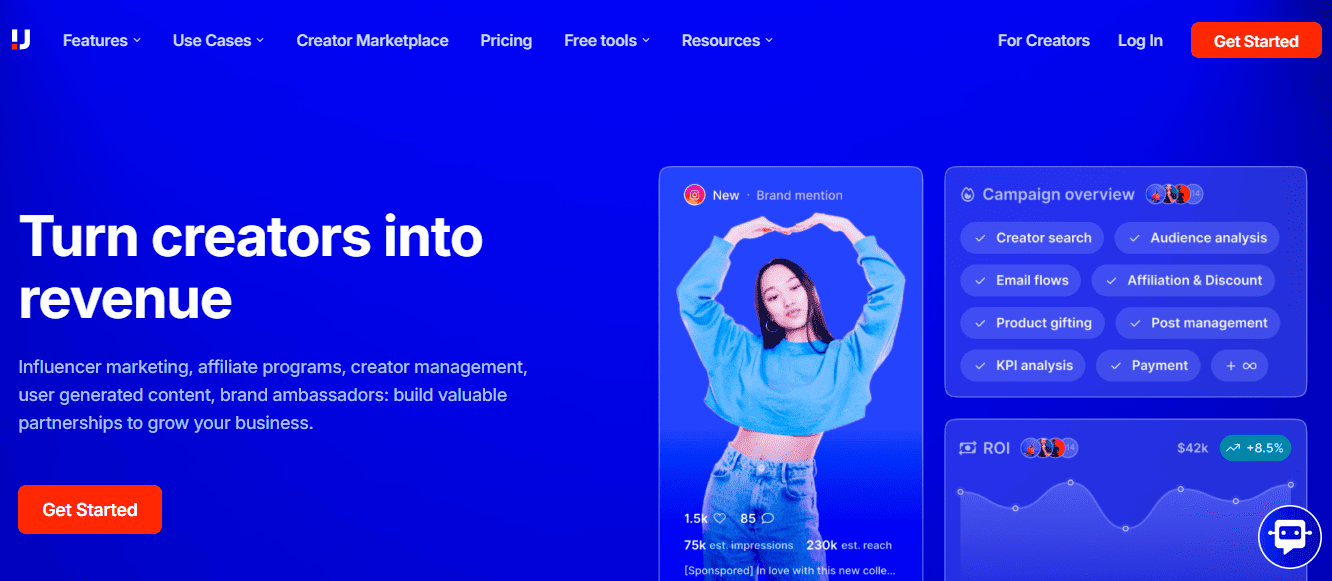
Upfluence is an enterprise influencer marketing platform tailored for eCommerce brands, integrating influencer discovery, outreach automation, affiliate tracking, and payments under one roof.
Key Features
- 12M+ influencer database with advanced AI filters
- Jace AI campaign assistant for automated email flows
- Shopify and Amazon integrations for sales attribution
- Affiliate and gifting workflows built-in
- Comprehensive performance tracking (sales, engagement, clicks)
- Bulk payments and outreach automation
Pricing
- Starts at $1,276/month (annual contract); optional features like payments add $399/month.
Pros
- Excellent eCommerce integrations (Shopify, Amazon)
- No commission fees on sales
- End-to-end influencer campaign management
- Proven ROI data for DTC brands
Cons
- Expensive with annual-only contracts
- Steep learning curve for new users
- Some location data inaccuracies reported
- Editing restrictions within campaign builder
10. GRIN
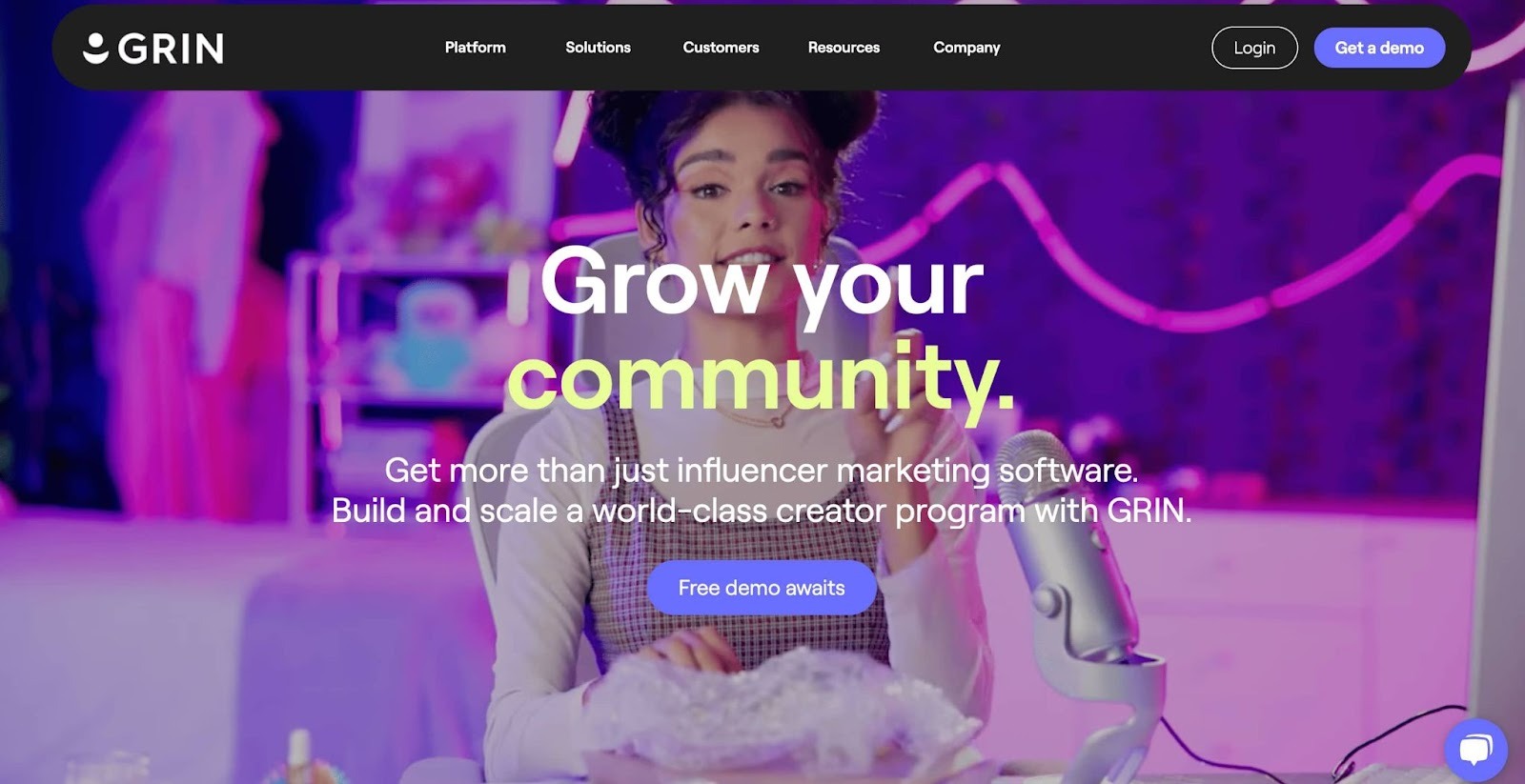
GRIN is an all-in-one influencer marketing platform purpose-built for eCommerce and DTC brands. It focuses on full-cycle campaign management, from discovery to gifting, payments, and content reuse.
Key Features
- AI-powered influencer discovery and lookalike matching
- Integrated CRM and email outreach (Gmail, Outlook, Klaviyo)
- Shopify + PayPal integrations for gifting and payments
- Automatic UGC rights and media library
- Affiliate dashboards for creators with real-time sales tracking
- AI assistant “Gia” for campaign optimization and creator scoring
Pricing
- Starts around $2,500/month; custom pricing up to $10,000+/month (12-month minimum).
Pros
- Designed specifically for eCommerce & DTC workflows
- AI-powered assistant simplifies management
- Unlimited creator partnerships
- Built-in rights management and content library
Cons
- High starting price for small businesses
- Database limited to opt-in creators
- No paid ad boosting capabilities
- Pricing transparency could be clearer
Final Thoughts on the Top 10 Best Influencer Analytics Tools
From enterprise solutions like CreatorIQ, Traackr, and Sprout Social to accessible options such as Heepsy, HypeAuditor, and Modash, each platform offers distinct advantages depending on your brand’s size and goals. Enterprise tools excel in data depth and integrations, while smaller platforms prioritize usability and affordability.
When it comes to balancing functionality, automation, and price, Influencer Hero stands out as the most complete solution. It combines advanced analytics, AI-driven outreach, and seamless eCommerce integrations, offering enterprise-level performance without the high cost. For brands seeking an all-in-one platform to manage discovery, tracking, and optimization, Influencer Hero is the clear winner.



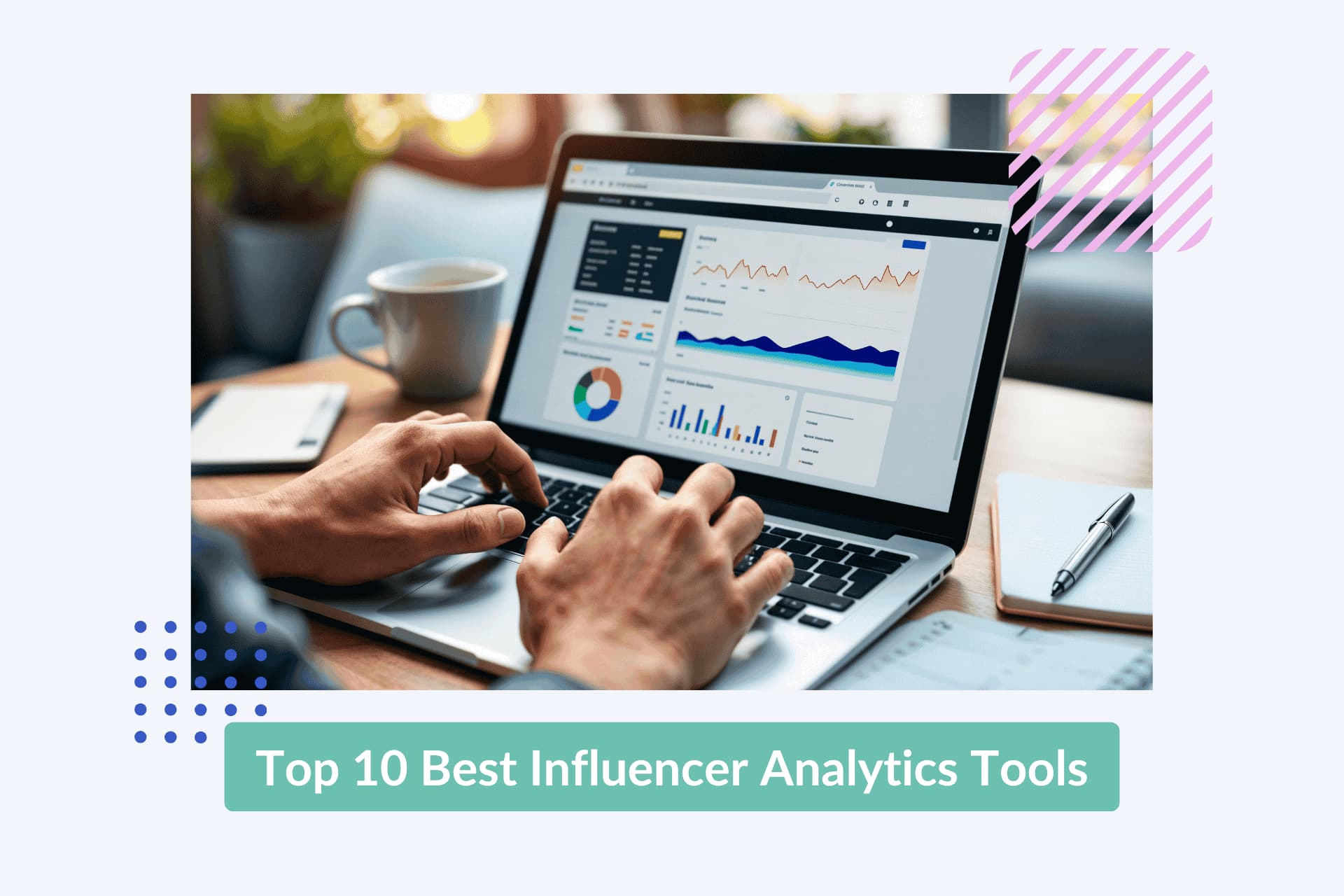

.svg)

%201.png)












_logo.svg.png)








